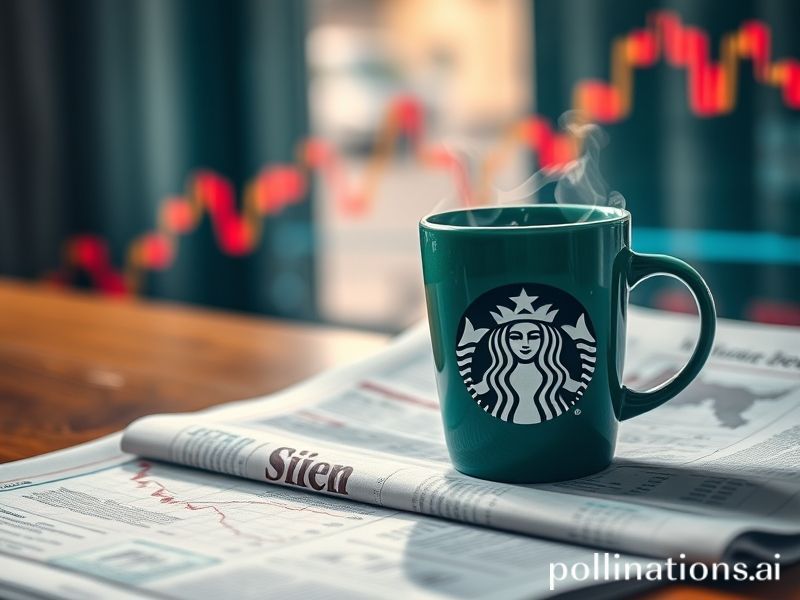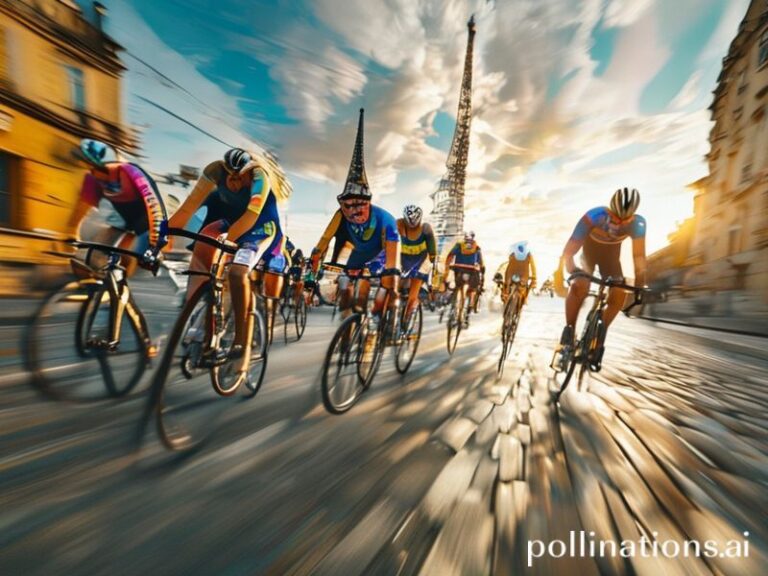Global Jitters: How SBUX Stock Became the World’s Caffeinated Mood Ring
If you want a single ticker to explain late-stage capitalism’s planetary conquest, look no further than SBUX—Starbucks, the green mermaid that has caffeinated the globe until even the glaciers are considering an espresso shot. From the moment the Nasdaq bell rings in New York, the stock pirouettes through time zones like a jittery insomniac, dragging London fund managers, Tokyo pension funds, and Riyadh sovereign-wealth princes along for the ride. Each quarterly report is less a balance sheet than a geopolitical weather map: when Chinese same-store sales dip, entire supply chains from Colombian fincas to German roasteries feel the frost. When U.S. union drives gain steam, analysts in Singapore suddenly price in the terrifying possibility that baristas might demand living wages—perish the thought.
Consider last month’s earnings call. Management blamed a 9 % slide on “macro headwinds,” which is earnings-call Latin for “our customers can no longer afford six-dollar oat-milk lattes because their rent now costs a kidney.” Yet in the same breath, the CFO bragged about 350 new stores in China, a country where the government’s idea of consumer protection is politely asking companies to please not poison anyone too visibly. The irony was so thick you could spread it on a croissant—assuming you still have the disposable income for pastries.
Zoom out and SBUX is less a coffee company than an index of global anxiety. When the yen collapses, Japanese commuters skip the Venti; the stock dips. When the EU threatens a plastics ban, the share price twitches at the prospect of losing those iconic green straws—tiny plastic tubes that now function as the Western world’s emotional support infrastructure. Meanwhile, in India, Starbucks has partnered with Tata to serve turmeric lattes to scooter-riding tech bros who’ll gladly pay half a day’s salary for the privilege of Instagramming the logo. The planet burns, but at least the filters are Valencia.
Then there are the supply-chain funerals. Arabica beans, once the gentle crop of misty Andean hillsides, are now a Wall Street commodity thrashed by climate change, drought, and the occasional paramilitary group that hasn’t yet discovered crypto. Starbucks hedges this volatility with financial derivatives so complex they require a PhD in quantum misery; meanwhile, the actual farmers receive a “premium” that works out to roughly three extra cents per kilo—just enough to replace the duct tape on their mules. The market applauds the firm’s “sustainability bonds,” which is finance-speak for “we printed green ink on the prospectus.”
And let us not forget labor relations, that quaint 19th-century concept enjoying a surprise comeback. From Buffalo to Brisbane, baristas are unionizing faster than you can say “double-shot, no-foam.” Each successful vote sends SBUX stock wobbling, as analysts recalibrate the risk that workers might—brace yourselves—share in the profits they generate. Wall Street’s horror is palpable: imagine, profits trickling downward instead of squirting straight into buybacks. The mere rumor of paid sick leave in Seattle can shave a billion off market cap, proving conclusively that the invisible hand is wearing a latex glove and clutching a caramel macchiato for comfort.
Yet for all the gloom, the stock keeps bouncing back, buoyed by the unshakable faith that humanity will always need caffeine and a place to pretend to work on a screenplay. Emerging markets alone could keep the mermaid swimming for decades: Lagos just got its first drive-thru, complete with armed guards to deter latte bandits. At this rate, Starbucks will be the last functioning embassy on Mars, serving dehydrated Frappuccinos to Elon’s colonists while they argue over whose turn it is to terraform the restroom.
So what does SBUX tell us about the world? Simply this: we are over-leveraged, under-slept, and terminally brand-loyal. The stock price is our collective pulse—spiking on hope, crashing on reality, then rallying again because decaf is not an option. Until the oceans swallow the ports and the last coffee bean withers into folklore, the green mermaid will keep flashing her seductive tail, promising that everything will be okay if we just add an extra shot. And we will believe her, because the alternative is admitting we’re drinking boiled water and anxiety in recyclable cups.







